Taipei has been on a bit of a burger binge lately with so many new concepts opening up, yet burger hounds have still been searching for the real McCoy. So when I started hearing that a new burger joint had opened up by a New Yorker and it was comparable to California’s legendary In-N-Out Burger, I went on a mission to Burger and Co. with the highest of expectations. So high that it was very unlikely the burgers would live up to their hype.
But they did. So much that I went back three times in four days.
Burger & Co. only has three tables plus some additional bar stools and a small outdoor area. The white and yellow brick wall and wood finishings lend the interior an warm and inviting atmosphere. The kitchen takes up half of the small room, so you can watch the patties sizzle tantalizingly away.
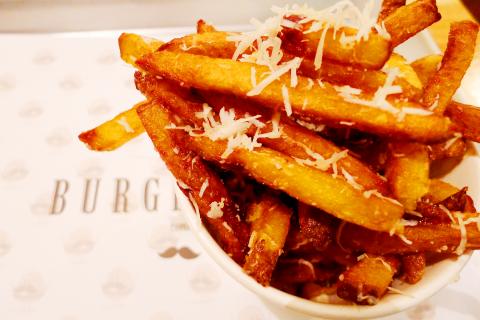
Photo: Olivia Wycech
The menu is equally modest. Burger, fries, wings and a salad are the few items that Burger & Co. offers, and the burgers are far from being pub-sized, so if you are hungry you might want to order two. It’s a good plan since most items are NT$170 or less, and you’ll be hard-pressed to pick only one anyway.
On my first trip, I had a burger with jack cheese and jalapenos (NT$170). It’s not on the official menu but it was on the specials board. My first bite was revelatory. It was the juiciest and most tender burger I’d ever had in Taipei. This is partially because the patties are made in-house from imported Australian and American meat, and seared to order. Mine came out a perfect medium rare. This makes for a fairly juicy burger, but things can get a bit messy.
On my second trip, I had the BBQ pulled pork sandwich (NT$150) which was a heavenly combination of flavors beautifully balanced by the creamy red cabbage coleslaw that complements a very generous layering of sweet and exceptionally succulent pork.
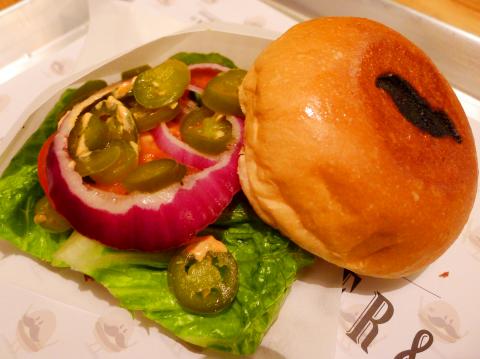
Photo: Olivia Wycech
Vegetarians will appreciate the veggie burger (NT$170). The mushroom-based patty is tender and moist — something that most veggie burgers aren’t. It comes topped with American cheese and the same slaw as the pulled pork sandwich.
All burgers come on soft white buns that are made especially for the restaurant and are emblazoned with their trademark moustache, which also adds an appealingly crispy texture to the bun.
Sides include a house salad (NT$60), which is so basic I wouldn’t recommend it. And don’t just stop at the classic fries (NT$70); the truffle cheese fries (NT$150) are utterly exquisite — though lately they’ve reduced, much to my disappointment, the amount of oil. Still, the scent of truffle oil arrives at the table along with the fries, which are decorated with fine shavings of cheese. The fries are hand cut from russet potatoes, which is a welcome change in flavor and texture to most burger joints in Taipei.
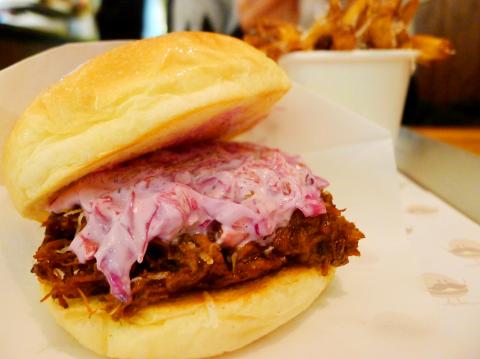
Photo: Olivia Wycech
The buffalo and BBQ wings (NT$140 for 6, NT$260 for 12) are a great choice for sharing while you wait for your burgers. The flavors for both are quite similar, sweetness and tang present in both, but the buffalo wings are a touch spicier, the BBQ ones smokier. The sauces are lathered onto the wings, which were surprisingly meaty.
Burger & Co. has a limited drink menu of soft drinks, beers and coffee (NT$40 to NT$100), with talks of a soft serve ice cream machine in the not so distant future. Overall, the burgers at Burger & Co. are reasonably priced, fresh and succulent, making it one of the must-visit burger joints in Taipei.
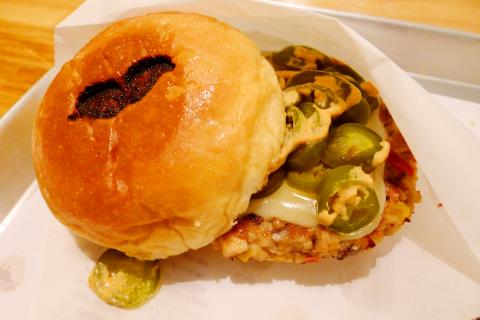
Photo: Olivia Wycech
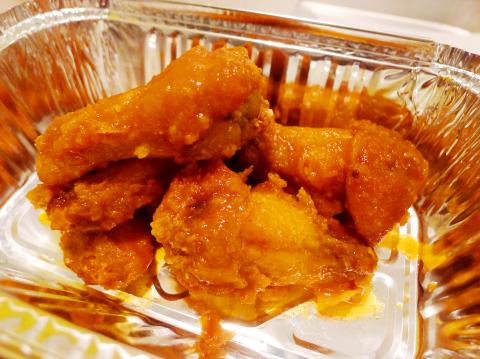
Photo: Olivia Wycech

Exceptions to the rule are sometimes revealing. For a brief few years, there was an emerging ideological split between the Democratic Progressive Party (DPP) and Chinese Nationalist Party (KMT) that appeared to be pushing the DPP in a direction that would be considered more liberal, and the KMT more conservative. In the previous column, “The KMT-DPP’s bureaucrat-led developmental state” (Dec. 11, page 12), we examined how Taiwan’s democratic system developed, and how both the two main parties largely accepted a similar consensus on how Taiwan should be run domestically and did not split along the left-right lines more familiar in

As I finally slid into the warm embrace of the hot, clifftop pool, it was a serene moment of reflection. The sound of the river reflected off the cave walls, the white of our camping lights reflected off the dark, shimmering surface of the water, and I reflected on how fortunate I was to be here. After all, the beautiful walk through narrow canyons that had brought us here had been inaccessible for five years — and will be again soon. The day had started at the Huisun Forest Area (惠蓀林場), at the end of Nantou County Route 80, north and east

Specialty sandwiches loaded with the contents of an entire charcuterie board, overflowing with sauces, creams and all manner of creative add-ons, is perhaps one of the biggest global food trends of this year. From London to New York, lines form down the block for mortadella, burrata, pistachio and more stuffed between slices of fresh sourdough, rye or focaccia. To try the trend in Taipei, Munchies Mafia is for sure the spot — could this be the best sandwich in town? Carlos from Spain and Sergio from Mexico opened this spot just seven months ago. The two met working in the

This month the government ordered a one-year block of Xiaohongshu (小紅書) or Rednote, a Chinese social media platform with more than 3 million users in Taiwan. The government pointed to widespread fraud activity on the platform, along with cybersecurity failures. Officials said that they had reached out to the company and asked it to change. However, they received no response. The pro-China parties, the Chinese Nationalist Party (KMT) and Taiwan People’s Party (TPP), immediately swung into action, denouncing the ban as an attack on free speech. This “free speech” claim was then echoed by the People’s Republic of China (PRC),